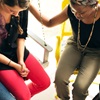Shipwreck!
It was after midnight on March 24, 1989, when the Exxon Valdez, an oil tanker leaving the Trans Alaska Pipeline Terminal, struck Bligh Reef in Prince William Sound, tearing open the hull and dumping eleven million gallons of sticky, black crude oil into the ocean. The resulting oil slick polluted the shores and destroyed wildlife in Valdez Harbor. It was the worst oil spill in U.S. history. Many of us can remember the video footage of the disaster: sea birds blackened with a coat of crude that grounded them and rocky coastlines ringed with a dark, oily froth… it was a mess!
You are at the helm
In a small group journeying toward deeper levels of community, a relational shipwreck can be just about as messy and damaging as that Alaskan disaster. The wreck can take many forms. It could be as simple as a personality clash that leads to harsh words and hurt feelings or as complex as a betrayed confidence that exposes a grapevine of gossip. It might be as innocuous as an inattentive and apathetic member who drags the group down or as serious as the revelation of an extramarital affair that shocks the group into a judgmental silence. No matter what the difficult situation, it can destroy cooperation, communication, intimacy, and accountability—all vital aspects of healthy community. However, just as the helmsman steering the tanker could have avoided crashing into the reef, you can guide your group safely through rough times of relational distress. You cannot avoid the struggles completely. Imperfect people will never relate together perfectly, but you can work through small group tensions in healthy ways that deepen community, help prevent future conflict, and glorify God.
Plot your course
A great way to prepare for challenging times is to examine your own attitude first. Even before you take on leadership of a small group. Make the commitment ahead of time to love everyone in the small group no matter what. Be assured that God will help you! Because we are loved by God, we love Him and are able to love the people He loves. "We love because He first loved us." I John 4:19 (NIV) You can choose to love, determining beforehand your willingness to esteem others regardless of their differences. Your understanding and openness toward each member of the group will be an expression of the love of God to them. By choosing to patiently resolve conflicts as they arise, you will demonstrate the attributes of empathy and respect—characteristics that cultivate healthy interdependence. Commit to praying daily for each member of the group by name, asking God to help you love them with His love.
Ride out the storms
Even if you love the members of your small group, they may not find it easy to love one another, at least not at first. Like bad weather that churns the surface of the sea, occasional tension among participants is inevitable. In fact, conflict is a sure sign of progress toward community. Expect it! When a band of individuals is consistently brought together in an atmosphere of grace and acceptance, each is able to reveal more of the real person behind the mask they wear. This kind of fellowship is not the same as would be experienced in a typical Sunday morning church service. Small groups allow people to express their true personalities, sharing perspectives and opinions that may at times leave them at odds with one another. For community to develop and genuine ministry to occur, small group members have to learn to be authentic, revealing their hidden identities to God and each other. This can be an awkward and even painful process, but it is necessary and good.
Stay the course
If the prospect of dealing with discord is a bit frightening, remember that not facing the issues can be even more distressing. Although processing all the negative emotions and misunderstandings can be draining and uncomfortable, you cannot ignore the problem, hoping it will just go away. If you do, you may unwittingly be steering your group into a reef of broken relationships that may never be mended. Instead, choose to embrace the task of identifying and confronting the sources of conflict. Where trust has been betrayed, feelings crushed, or resentments allowed to fester, you may need to lead the group through a process of confession, forgiveness, and restoration. When misunderstandings arouse anger, you might have to correct a deficiency in listening skills—the ability to understand what people really mean rather than what we think they said. By confronting every concern in a caring and gentle manner, you have the opportunity to help others grow and mature. However, resist the temptation to rush in and fix everything. Instead, try to discover what God is doing in the midst of the mess, and seek His direction. That might mean spending time in meditation or journaling before you make a move. Then, when you are ready to take action, commit yourself again to love and humility. Remember to use tact and respect at all times. Be flexible and observant to discern whether issues should be resolved as a group or one-on-one. Either way, prayer is a key element in finding the way through the fighting. Sometimes, the very act of praying together about the struggle will bring about a surprising change of attitude!
Don't abandon ship
If, in the midst of crisis, members begin to talk about taking a break from the group or shipping out entirely, it may be helpful to share with them the end you have in mind. Encourage the Biblical goal of trust, intimacy, and dependence upon one another that will arise as they apply God's word to their lives together. Jesus' prayer for believers was "that all of them may be one, Father, just as you are in me and I am in you. May they also be in us so that the world may believe that you have sent me." (John 17:21 NIV) When all the attention is on problems, let that prayer guide your group back to a focus on Christ. Help them to see that if being like Christ is their goal, experiences like these expose the "fleshy" areas that need to be dealt with. These parts of ourselves that hurt and irritate others (or are constantly irritated by others) might be aspects that are deprived of the Spirit of God and dominated by sin. "For everything in the world—the cravings of sinful man, the lust of his eyes and the boasting of what he has and does—comes not from the Father but from the world.." (1 John 2:16 NIV) If it is the sinful stuff of the world that is at the root of your group's disharmony, then God probably has everyone exactly where they need to be. Your job is to encourage them (and yourself!) to persevere.
Smooth sailing
Community does not develop in a day but through daily communication, cooperation, and compromise. Likewise, small group tensions can ebb and flow over time. Overall, though, you can expect relational struggles to lessen as each person willingly accepts the invitation to change their attitude or behavior. To maintain what you have gained in your group, teach them the art of accountability. Help them to lovingly hold one another to the standards of Scripture, encouraging each other to remain faithful. Remind them how important it is to be honest with one another, laying down the masks time after time, confessing sin, expressing pain, and sharing burdens. Do this, and the resulting depth of communion will empower the group to freely serve the Body and reach out to the lost. Rather than becoming ingrown, your group will begin to look outward and to anticipate the next stage of the voyage!









